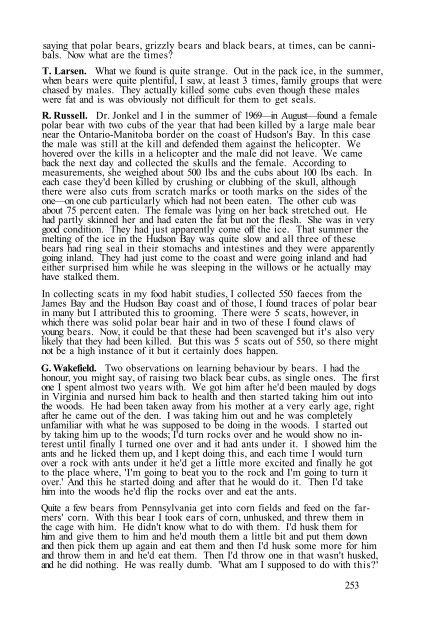Bears - IUCN
Bears - IUCN
Bears - IUCN
Create successful ePaper yourself
Turn your PDF publications into a flip-book with our unique Google optimized e-Paper software.
saying that polar bears, grizzly bears and black bears, at times, can be cannibals.<br />
Now what are the times?<br />
T. Larsen. What we found is quite strange. Out in the pack ice, in the summer,<br />
when bears were quite plentiful, I saw, at least 3 times, family groups that were<br />
chased by males. They actually killed some cubs even though these males<br />
were fat and is was obviously not difficult for them to get seals.<br />
R. Russell. Dr. Jonkel and I in the summer of 1969—in August—found a female<br />
polar bear with two cubs of the year that had been killed by a large male bear<br />
near the Ontario-Manitoba border on the coast of Hudson's Bay. In this case<br />
the male was still at the kill and defended them against the helicopter. We<br />
hovered over the kills in a helicopter and the male did not leave. We came<br />
back the next day and collected the skulls and the female. According to<br />
measurements, she weighed about 500 lbs and the cubs about 100 lbs each. In<br />
each case they'd been killed by crushing or clubbing of the skull, although<br />
there were also cuts from scratch marks or tooth marks on the sides of the<br />
one—on one cub particularly which had not been eaten. The other cub was<br />
about 75 percent eaten. The female was lying on her back stretched out. He<br />
had partly skinned her and had eaten the fat but not the flesh. She was in very<br />
good condition. They had just apparently come off the ice. That summer the<br />
melting of the ice in the Hudson Bay was quite slow and all three of these<br />
bears had ring seal in their stomachs and intestines and they were apparently<br />
going inland. They had just come to the coast and were going inland and had<br />
either surprised him while he was sleeping in the willows or he actually may<br />
have stalked them.<br />
In collecting scats in my food habit studies, I collected 550 faeces from the<br />
James Bay and the Hudson Bay coast and of those, I found traces of polar bear<br />
in many but I attributed this to grooming. There were 5 scats, however, in<br />
which there was solid polar bear hair and in two of these I found claws of<br />
young bears. Now, it could be that these had been scavenged but it's also very<br />
likely that they had been killed. But this was 5 scats out of 550, so there might<br />
not be a high instance of it but it certainly does happen.<br />
G. Wakefield. Two observations on learning behaviour by bears. I had the<br />
honour, you might say, of raising two black bear cubs, as single ones. The first<br />
one I spent almost two years with. We got him after he'd been mauled by dogs<br />
in Virginia and nursed him back to health and then started taking him out into<br />
the woods. He had been taken away from his mother at a very early age, right<br />
after he came out of the den. I was taking him out and he was completely<br />
unfamiliar with what he was supposed to be doing in the woods. I started out<br />
by taking him up to the woods; I'd turn rocks over and he would show no interest<br />
until finally I turned one over and it had ants under it. I showed him the<br />
ants and he licked them up, and I kept doing this, and each time I would turn<br />
over a rock with ants under it he'd get a little more excited and finally he got<br />
to the place where, 'I'm going to beat you to the rock and I'm going to turn it<br />
over.' And this he started doing and after that he would do it. Then I'd take<br />
him into the woods he'd flip the rocks over and eat the ants.<br />
Quite a few bears from Pennsylvania get into corn fields and feed on the farmers'<br />
corn. With this bear I took ears of corn, unhusked, and threw them in<br />
the cage with him. He didn't know what to do with them. I'd husk them for<br />
him and give them to him and he'd mouth them a little bit and put them down<br />
and then pick them up again and eat them and then I'd husk some more for him<br />
and throw them in and he'd eat them. Then I'd throw one in that wasn't husked,<br />
and he did nothing. He was really dumb. 'What am I supposed to do with this?'<br />
253

















